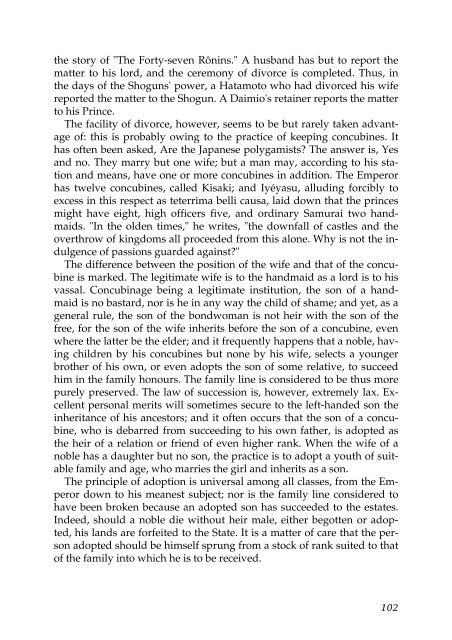You also want an ePaper? Increase the reach of your titles
YUMPU automatically turns print PDFs into web optimized ePapers that Google loves.
the story <strong>of</strong> "The Forty-seven Rônins." A husband has but to report the<br />
matter to his lord, and the ceremony <strong>of</strong> divorce is completed. Thus, in<br />
the days <strong>of</strong> the Shoguns' power, a Hatamoto who had divorced his wife<br />
reported the matter to the Shogun. A Daimio's retainer reports the matter<br />
to his Prince.<br />
The facility <strong>of</strong> divorce, however, seems to be but rarely taken advantage<br />
<strong>of</strong>: this is probably owing to the practice <strong>of</strong> keeping concubines. <strong>It</strong><br />
has <strong>of</strong>ten been asked, Are the <strong>Japan</strong>ese polygamists? The answer is, Yes<br />
and no. They marry but one wife; but a man may, according to his station<br />
and means, have one or more concubines in addition. The Emperor<br />
has twelve concubines, called Kisaki; and Iyéyasu, alluding forcibly to<br />
excess in this respect as teterrima belli causa, laid down that the princes<br />
might have eight, high <strong>of</strong>ficers five, and ordinary Samurai two handmaids.<br />
"In the olden times," he writes, "the downfall <strong>of</strong> castles and the<br />
overthrow <strong>of</strong> kingdoms all proceeded from this alone. Why is not the indulgence<br />
<strong>of</strong> passions guarded against?"<br />
The difference between the position <strong>of</strong> the wife and that <strong>of</strong> the concubine<br />
is marked. The legitimate wife is to the handmaid as a lord is to his<br />
vassal. Concubinage being a legitimate institution, the son <strong>of</strong> a handmaid<br />
is no bastard, nor is he in any way the child <strong>of</strong> shame; and yet, as a<br />
general rule, the son <strong>of</strong> the bondwoman is not heir with the son <strong>of</strong> the<br />
free, for the son <strong>of</strong> the wife inherits before the son <strong>of</strong> a concubine, even<br />
where the latter be the elder; and it frequently happens that a noble, having<br />
children by his concubines but none by his wife, selects a younger<br />
brother <strong>of</strong> his own, or even adopts the son <strong>of</strong> some relative, to succeed<br />
him in the family honours. The family line is considered to be thus more<br />
purely preserved. The law <strong>of</strong> succession is, however, extremely lax. Excellent<br />
personal merits will sometimes secure to the left-handed son the<br />
inheritance <strong>of</strong> his ancestors; and it <strong>of</strong>ten occurs that the son <strong>of</strong> a concubine,<br />
who is debarred from succeeding to his own father, is adopted as<br />
the heir <strong>of</strong> a relation or friend <strong>of</strong> even higher rank. When the wife <strong>of</strong> a<br />
noble has a daughter but no son, the practice is to adopt a youth <strong>of</strong> suitable<br />
family and age, who marries the girl and inherits as a son.<br />
The principle <strong>of</strong> adoption is universal among all classes, from the Emperor<br />
down to his meanest subject; nor is the family line considered to<br />
have been broken because an adopted son has succeeded to the estates.<br />
Indeed, should a noble die without heir male, either begotten or adopted,<br />
his lands are forfeited to the State. <strong>It</strong> is a matter <strong>of</strong> care that the person<br />
adopted should be himself sprung from a stock <strong>of</strong> rank suited to that<br />
<strong>of</strong> the family into which he is to be received.<br />
102



